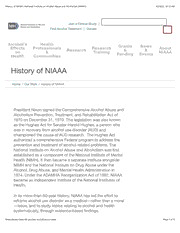
History of NIAAA PDF
Preview History of NIAAA
History of NIAAA | National Institute on Alcohol Abuse and Alcoholism (NIAAA) 4/25/22, 10:12 AM Search NIAAA Join a Clinical Study | Find Alcohol Treatment | Donate Alcohol's Health Grants News Effects Professionals Research About Research & & on & Training NIAAA Funding Events Health Communities History of NIAAA Home / Our Work / History of NIAAA President Nixon signed the Comprehensive Alcohol Abuse and Alcoholism Prevention, Treatment, and Rehabilitation Act of 1970 on December 31, 1970. This legislation was also known as the Hughes Act for Senator Harold Hughes, a person who was in recovery from alcohol use disorder (AUD) and championed the cause of AUD research. The Hughes Act authorized a comprehensive Federal program to address the prevention and treatment of alcohol-related problems. The National Institute on Alcohol Abuse and Alcoholism was first established as a component of the National Institute of Mental Health (NIMH). It then became a separate institute alongside NIMH and the National Institute on Drug Abuse under the Alcohol, Drug Abuse, and Mental Health Administration in 1974. Under the ADAMHA Reorganization Act of 1992, NIAAA became an independent institute of the National Institutes of Health. In its more-than-50-year history, NIAAA has led the effort to reframe alcohol use disorder as a medical—rather than a moral —issue, and to study topics relating to alcohol and health systematically, through evidence-based findings. https://www.niaaa.nih.gov/our-work/history-niaaa Page 1 of 6 History of NIAAA | National Institute on Alcohol Abuse and Alcoholism (NIAAA) 4/25/22, 10:12 AM Throughout its history, NIAAA has conducted and supported research that has improved our understanding of the effects of alcohol on health and well-being, as well as influenced legislation and attitudes toward alcohol in our society. Some key events in alcohol research over the Institute’s history include: 1971—First Special Report to the U.S. Congress on Alcohol and Health issued. 1977—First national research workshop on fetal alcohol syndrome organized by NIAAA. 1977—First government health advisory on Fetal Alcohol Spectrum Disorders issued. 1981—U.S. Surgeon General’s Advisory on Alcohol and Pregnancy published. 1988—Minimum legal drinking age law instituted. 1988—Legislation passed requiring that alcoholic beverage containers be labeled with a warning of the adverse effects of alcohol on the developing fetus. 1989—Collaborative Studies on Genetics of Alcoholism (COGA) initiated. 1991—National Longitudinal Alcohol Epidemiologic Survey (NLAES) launched. 1994—FDA approves naltrexone, a drug that can reduce alcohol craving; in 2006, a long-lasting injectable version of the drug is approved. 1998—Creation of the Task Force on College Drinking. 1999—First National Alcohol Screening Day. https://www.niaaa.nih.gov/our-work/history-niaaa Page 2 of 6 History of NIAAA | National Institute on Alcohol Abuse and Alcoholism (NIAAA) 4/25/22, 10:12 AM 2001—National Epidemiologic Survey on Alcohol and Related Conditions (NESARC) launched. 2002—A Call to Action: Changing the Culture of Drinking at U.S. Colleges published. 2002—Interdisciplinary Neuroscience Initiative on Alcoholism established. 2003—Creation of the Collaborative Initiative on Fetal Alcohol Spectrum Disorders. 2003—Prenatal Alcohol, Sudden Infant Death Syndrome, and Stillbirth Research Network launched. 2004—Underage Drinking Research Initiative established. 2005—U.S. Surgeon General’s Advisory on Alcohol and Pregnancy updated. 2005—NIAAA releases Helping Patients Who Drink Too Much: A Clinician's Guide. 2007—The Surgeon General's Call to Action to Prevent and Reduce Underage Drinking released. 2007—Clinical Investigations Group established. 2007—NIAAA shares an Emmy award with HBO, the Robert Wood Johnson Foundation, and the National Institute on Drug Abuse for The Addiction Project. 2009—NIAAA releases the Rethinking Drinking interactive Website and print publication. 2010—NIAAA celebrates its 40th year of alcohol research. 2011—NIAAA releases Alcohol Screening and Brief Intervention https://www.niaaa.nih.gov/our-work/history-niaaa Page 3 of 6 History of NIAAA | National Institute on Alcohol Abuse and Alcoholism (NIAAA) 4/25/22, 10:12 AM for Youth: A Practitioner's Guide. 2016—NIAAA collaborates with HBO Documentary Films to produce Risky Drinking. 2017—NIAAA launches the site AlcoholTreatment.niaaa.nih.gov. NIAAA Directors Starting Director Date Ending Date Morris E. Chafetz 1972 September 1, 1975 Ernest P. Noble February April 1978 1976 Loran Archer (Acting) April 1978 April 1979 John R. DeLuca May 1979 October 1981 Loran Archer (Acting) November July 1982 1981 https://www.niaaa.nih.gov/our-work/history-niaaa Page 4 of 6 History of NIAAA | National Institute on Alcohol Abuse and Alcoholism (NIAAA) 4/25/22, 10:12 AM William E. Mayer August 1982 July 1983 (Acting) Robert G. Niven August 1983 December 1985 Loran Archer (Acting) January 1986 October 1986 Enoch Gordis November January 2002 1986 Raynard Kington January 2002 November 2002 (Acting) Ting-Kai Li November October 2008 2002 Kenneth R. Warren November December 2013 (Acting) 2008 George F. Koob January 2014 Present To learn more about NIAAA’s history, please see: https://www.niaaa.nih.gov/our-work/history-niaaa Page 5 of 6 History of NIAAA | National Institute on Alcohol Abuse and Alcoholism (NIAAA) 4/25/22, 10:12 AM NIAAA at 50: A Legacy of Advancing Alcohol Research The 40th-anniversary issue of the Institute’s peer-reviewed scientific journal, Alcohol Research: Current Reviews: https://pubs.niaaa.nih.gov/publications/arh40/toc33-1_2.htm “40 Years of Research Leadership” - https://pubs.niaaa.nih.gov/publications/AA79/AA79.htm The NIAAA Director’s page: https://www.niaaa.nih.gov/about- niaaa/our-staff/directors-page https://www.niaaa.nih.gov/our-work/history-niaaa Page 6 of 6
